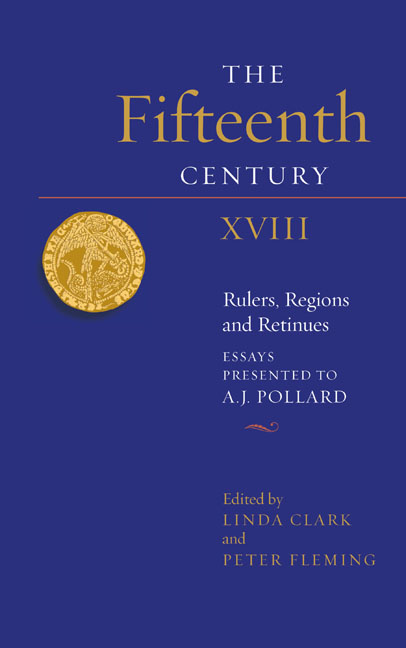The Commission to ensure Good Governance of 11 May 1402: A Case Study of Lancastrian Counter-Propaganda
Published online by Cambridge University Press: 24 November 2020
Summary
The year 1402 did not begin well for Henry of Lancaster. While the usurper had suppressed the Earls’ Rebellion at Epiphany 1400, the ease with which he did so belied greater problems looming on the political horizon. The uneasy peace with the Scots collapsed in early 1400 and Henry's campaign to Edinburgh that summer yielded no tangible results. Instability and incessant border reiving continued to plague the northern marches and by the end of the year north Wales had erupted in rebellion, led by Owain Glyn Dŵr. The parliament of 1401, laden with the king's friends and supporters, provided a subsidy of one tenth and one fifteenth, and the treasury was further supplemented by the calling of a ‘feudal aid’ for the marriage of Henry's daughter, Blanche, but by the end of the year it seemed that the only materials remaining in the exchequer were air and dust.
From the beginning of the reign, anti-royalist lies, half-truths, rumours and deceptions seemed to permeate the realm from the epicentre of government at Westminster to the most remote holt and heath. As if disruptions on the ground were not enough, in February 1402 a comet appeared in the night sky and remained until Easter, which many interpreted as a harbinger of fearful change. The most virulent of these anti-government tales was the most unbelievable: that Richard II had made good his escape from Pontefract and found his way to Scotland. From there, about Midsummer Day (24 June), Richard would lead an army and raise his English supporters against ‘Henry of Lancaster’ before returning to his rightful place on the throne.
Henry and his government were well aware of these stories regarding the former king and worked diligently to counteract them. Several commissions were issued in January 1402 to arrest those suspected of Ricardian sympathies and bring them before the king and council. Yet, it was clear by the spring that the rumours of Richard II's return had not subsided. As spring gave way to summer and the feast of St. John the Baptist, or Midsummer's Day, drew closer, the tales of Richard's return only increased. In response to these rumours and seditions, on 11 May the crown sent an extraordinary commission to every county in the realm except Kent.
- Type
- Chapter
- Information
- The Fifteenth Century XVIIIRulers, Regions and Retinues. Essays presented to A.J. Pollard, pp. 17 - 26Publisher: Boydell & BrewerPrint publication year: 2020

